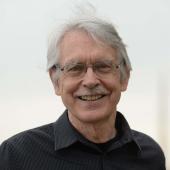
Composer John Harbison’s concert music catalog of almost 300 works is anchored by three operas, seven symphonies, twelve concerti, a ballet, six string quartets, numerous song cycles and chamber works, and a large body of sacred music that includes cantatas, motets, and the orchestral-choral works Four Psalms, Requiem, and Abraham. He has also penned a substantial body of jazz compositions and arrangements, and cadenzas for major violin and piano concertos.
Harbison has received commissions from most of America’s premiere musical institutions, including the Metropolitan Opera, Chicago Symphony, Boston Symphony, New York Philharmonic, and the Chamber Music Society of Lincoln Center. As one of America’s most distinguished artistic figures, he is recipient of numerous awards and honors, among them a MacArthur Fellowship and a Pulitzer Prize.
Harbison’s 80th birthday season, 2018-2019, was marked with celebrations throughout the country and around the world, including major city-wide celebrations in his two home-towns of Boston, Massachusetts and Madison, Wisconsin. The season included first performances of three major works: the monodrama If, the organ symphony What Do We Make of Bach? and the Sonata for Viola and Piano. Summer festival residencies included Songfest, Tanglewood, Aspen and Santa Fe. Harbison’s published his first book, What Do We Make of Bach: Portraits, Essays, Notes (ARS Nova) in late 2018.
Widely recorded on leading labels, recent CD releases include Concertos for String Instruments (BMOP), Remembering Gatsby (National Orchestral Institute Philharmonic, Naxos), Violin Sonata No. 1 (Cho-Liang Lin, Naxos), Late Air (Kendra Colton, Oberlin), Simple Daylight & Piano Sonata No. 2 (Lucy Fitz Gibbon and Ryan McCullough, Albany), String Quartet No. 6 (Lark Quartet, Bridge), Requiem (Nashville Symphony, Naxos), Vocalism (Mary Mackenzie, Albany), and his cadenzas to Beethoven’s fourth piano concerto (David Deveau, Steinway).
The 2019-20 season saw the consortium premiere of the monodrama IF (March, Chamber Music Society of Lincoln Center) just before the Covid-19 disruption. Premieres postponed due to the pandemic include two new song cycles, In the Early Evening and Four Poems for Robin (Songfest), Mark the Date (Aspen Music Festival), Sleepers Wake, for the Leipzig BachFest, and Passage (Shai Wosner, The Peoples’ Symphony). He recently penned a collection of jazz essays, and is working on a new series of composer reminiscences.
Harbison’s most recent projects include new choral music (Hidden Paths, Frost settings for childrens’ choir) and Cold or Hot (on a passage from Revelations). He also completed Chaconne (for big band), Piano Sonata No. 3, an evolving suite for solo violin, Prelude for Organ, the song cycle and After Long Silence (Yeats), and numerous short piano works, including his contribution to Min Kwon’s America/Beautiful variations project. He is at work on a new piece for Earplay, the 2022 competition piece for the International Violin Competition of Indianapolis, a 50th anniversary piece for Collage New Music, a string quintet, and a second volume of pop and jazz songs. His opera The Great Gatsby is due for major revival in 2025, an important anniversary year for both Fitzgeralds’ book and the opera’s premiere.
Harbison has been composer-in-residence with the Pittsburgh Symphony, Los Angeles Philharmonic, American Academy in Rome, and numerous festivals. He received degrees from Harvard and Princeton before joining the Massachusetts Institute of Technology, where he is currently Institute Professor, the highest honor accorded resident faculty. For many summers since 1984 he taught composition at Tanglewood, serving as head of its composition program from 2005 to 2015, often directing its Festival of Contemporary Music. With Rose Mary Harbison, the inspiration for many of his violin works (Violin Concerto, Four Songs of Solitude, Crane Sightings, Violin Sonata No. 2), he has been co-Artistic Director of the annual Token Creek Chamber Music Festival since its founding in 1989. He continues as principal guest conductor at Emmanuel Music (where for three years he served as Acting Artistic Director), and he is a past music director of Cantata Singers. An accomplished jazz pianist, Harbison founded MITs Vocal Jazz Ensemble in 2010, for which he served as coach and arranger, and he is pianist with the faculty jazz group Strength in Numbers (SIN).
Mr. Harbison has been President of the Copland Fund and a trustee of the American Academy in Rome. He is a member of the American Academy of Arts and Letters and is a Trustee of the Bogliasco Foundation. His music is published exclusively by Associated Music Publishers. A complete works list can be found at WiseMusicClassical.com.
Photo Credit: Julian Bullitt


